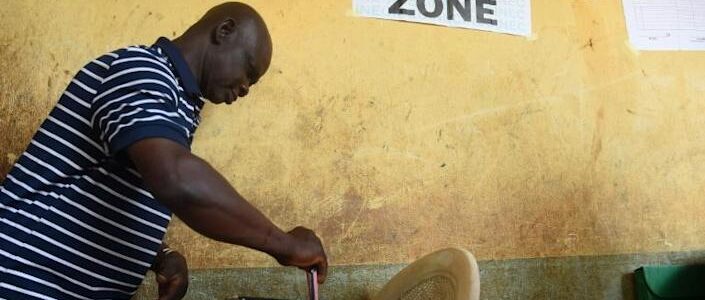
Technical problems hit a governorship election in Nigeria’s southeastern state of Anambra on Saturday during a vote seen as a test of the electoral system less than 18 months before presidential polls.
More than 30,000 police were dispatched to secure Anambra after a string of attacks in the southeast blamed on separatists from the Indigenous People of Biafra or IPOB who agitate for an independent state for the ethnic Igbo people.

The vote went ahead peacefully, but some polling stations in the capital Awka and outside in rural areas reported problems with the face and fingerprint recognition technology meant to better secure the ballot.
The Independent National Electoral Commission or INEC said in a statement it had extended voting initially by a few hours and until Sunday or beyond in some cases to make sure eligible voters could cast their ballot.

“The Commission is currently investigating the reason the accreditation devices… have worked perfectly in some polling stations and not in others,” a statement said on INEC’s Facebook page.
“In some of the cases, it would seem that this resulted from software glitches.”
INEC said in cases where the problem was sustained, then voting would voting would continue on Sunday or at another time determined by the commission.
At three polling stations visited by AFP south of Awka on Saturday morning, voters were either unable to cast their vote because of a failure of the accreditation technology or voting was slowed significantly, according to domestic observers.
Early election results were not due until Sunday.
Elections in Africa’s most populous state are often marred by fraud claims and violence, and analysts saw Anambra’s ballot and voter turnout as one barometer of confidence in INEC’s readiness for the ballot to replace President Muhammadu Buhari in 2023.
– Tight race –
The election developed into a tight race between Charles Chukwuma Soludo, with local powerhouse party All Progressive Grand Alliance (APGA), and the candidates from Buhari’s ruling All Progressives Congress (APC) party and the main opposition People’s Democratic Party (PDP).
Security fears were heightened when IPOB had called for a sit-in protest over the election period to demand the release of its arrested leader.
But IPOB on Thursday cancelled its protest and urged people to go out and vote.
“People came out and voted and it was peaceful,” said agricultural consultant Venentius Oneyekuba who voted in an Awka district. “There were some network problems but later it stabilised.”
Candidates and political parties signed a peace deal this week to accept the results of the vote if it is judged free and fair, and to avoid any violent clashes among their supporters.
Campaigning was low-key after attacks blamed on IPOB or “unknown gunmen” and repeated shutdown protests ordered by the separatist movement over the arrest of their leader.
Despite the cancelled order on Thursday, many markets in central Awka remained shut on Friday with traders saying people were staying at home because they were still worried about possible violence.
With political infighting heating up before the 2023 vote to replace Buhari, Anambra has emerged as key battleground with the ruling APC looking to consolidate in the southeast.
Separatist agitation is only one of the major security challenges facing Nigeria, where the army is also battling heavily armed criminal gangs in the northwest and a grinding 12-year-long jihadist insurgency in the northeast that has killed 40,000 people.
Credit: Yahoo News
